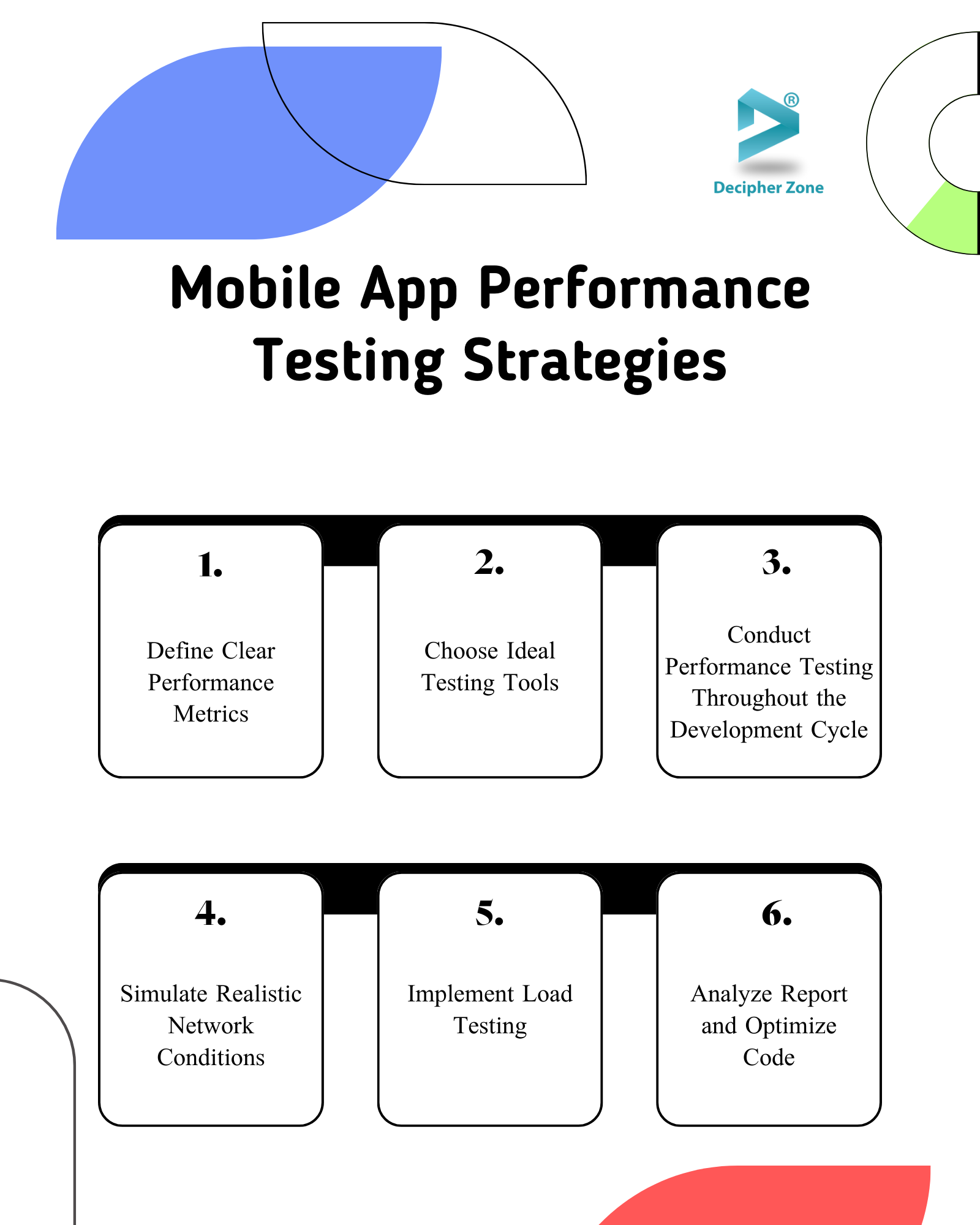How to Test Mobile App Performance? Business is undergoing a digital transformation as technology advances continuously. Also, with smartphones becoming an integral part of day-to-day lives, it is high time businesses prioritize mobile app performance for seamless functionality, better user experience, and faster page loading speed.
In this blog, we will explore how to test the performance of mobile applications to increase customer engagement and loyalty.
What is Mobile App Performance Testing?
Mobile app performance testing refers to analyzing and accessing the responsiveness, speed, stability, resource usage, network performance, compatibility, and efficiency of the mobile application under different circumstances and workloads.
Mobile performance testing ensures the app performs well and offers an incredible user experience across networks, devices, and usage conditions.
It is crucial to detect and address potential risks and issues before they affect the mobile app performance. With mobile performance testing, developers can reduce the risks of slowdowns, provide user satisfaction, and optimize the overall app performance.
Read More: Mobile App Architecture - A Comprehensive Guide
Why is Mobile App Performance Testing Important?
By analyzing mobile performance holistically, organizations can achieve several benefits that lead to their success. Testing mobile app performance is necessary for a variety of reasons, including:
1. Scalability Assessment
Application scalability is the key to success in the competitive market. With performance testing, developers can evaluate the mobile app's scalability by simulating increased traffic load. It helps detect potential bottlenecks and optimize app architecture to keep the app reliable and responsive even with a growing user base.
2. System Reliability
Performance testing ensures reliability and user satisfaction of the mobile application. Thus, developers must rigorously test an application under various conditions to assure its stability and reliability, which boosts user loyalty. Overall, performance testing ensures that crashes, freezes, and other issues can be identified and resolved.
3. User Satisfaction
Mobile app users expect a smooth and enjoyable experience. And performance testing helps developers meet these expectations. Developers can detect and eliminate issues such as slow-loading pages, unresponsive features, and frequent crashes to ensure a responsive user interface.
4. Performance Optimization
Performance testing allows developers to identify resource-heavy features, inefficient code, and other bottlenecks, impacting the app speed negatively.
Developers can improve the overall performance of their product by conducting iterative testing and optimization, resulting in faster load times, seamless transitions, and an interface that responds more promptly to user actions.
Read More: How to Find Investors for Mobile Application?
5. Risk Mitigation
Identifying and mitigating risks is essential to avoid costly post-launch fixes. Therefore, conducting performance testing assists in detecting potential security threats, compatibility issues, and vulnerabilities across different network connections and devices.
By resolving these concerns, developers seamlessly reduce the risk of data breaches, post-launch failures, and negative user experience.
Read More: What is Cyber Resilience: Components, Benefits and Threats
6. Brand Reputation
The performance of the brand's mobile application determines its reputation. Users tend to perceive slow or malfunctioning apps as poor quality, which may raise doubts about the brand's credibility.
On the other hand, a high-performing app can establish the brand's image as being technologically advanced and user-centric. Therefore, investing in performance testing is crucial to protect and elevate a brand's reputation.
Read More: How to Patent a Mobile App Idea? - Explained
7. Cost Optimization
Although some may consider performance testing an additional expense, it is a vital investment for the long-term success of a mobile application. Early identification and resolution of performance issues can save costs associated with bug fixes post-launch, customer support, and potential loss of revenue due to user abandonment.
The potential cost savings and revenue protection offered by performance testing outweigh the cost of testing by a significant margin.
Read More: Mobile App Development Process - A Step by Step Guide

Mobile App Performance Testing Strategy
The process of mobile app performance testing involves a set of evaluations that aim to verify the efficient functioning of your application across different scenarios. It is critical to have a well-planned performance testing strategy in place to detect roadblocks, eliminate potential problems, and provide a seamless mobile app experience. Here are a few key points to consider:
1. Define Clear Performance Metrics
First and foremost, identify the performance metrics of the mobile application. The performance metrics can include app start-up time, memory consumption, server/API response time, network speed, latency, throughput, and resource utilization.
Defining these metrics will help app performance evaluation and setting acceptable results expectations.
Read More: What is a RESTful API: Benefits and Authentication Methods
2. Choose Ideal Testing Tools
Opting for a suitable testing tool set is significant for a successful performance evaluation. Some of the tools you can go for, depending on your testing requirements, include LoadRunner, Apache JMeter, NeoLoad, Apptim, BlazeMeter, WebLOAD, Espresso, and Kobiton.
Read More: Top 10 Java Libraries You Should Know About
3. Conduct Performance Testing Throughout the Development Cycle
One should integrate performance testing at every phase of mobile app development to identify and resolve bugs, errors, and issues early on to reduce the risks and setbacks at the time of product market launch.
Read More: Top Mobile App Monetization Strategies to Consider
4. Simulate Realistic Network Conditions
For accurate app performance analysis in different network environments, developers should conduct performance testing under realistic network conditions. It will guarantee that the mobile app functions smoothly under various network scenarios without experiencing any lags or delays.
Read More: Proof of Concept in Software Development
5. Implement Load Testing
Simulating user loads to test the mobile app's responsiveness and stability under stress is known as load testing. Conducting load testing is essential to determine the maximum user load the app can handle without affecting performance to prevent crashes or slowdowns during peak usage. This step is crucial for ensuring the smooth performance of the app.
Read More: Guide to Native Mobile App Development - Benefits and Cost
6. Analyze Report and Optimize Code
The ultimate determinant of value in any test is the results. When you finish performance testing, it is necessary to scrutinize the outcome. You should evaluate whether the results align with your original expectations, and if they don't, find out why.
The performance report must cover your performance objectives, metrics, and test environment particulars. Furthermore, you must emphasize the areas where the performance was below par and your intended plans to enhance them.
Conclusion
Mobile performance testing plays a vital role in the success of the business application because poor app performance can lead to an increase in customer churn rate. Performance testing helps businesses ensure that the app delivers a seamless experience to the user and meets all the performance benchmarks.
So, if you are seeking to develop a performance-optimized mobile app or want to improve the performance of your existing application, then contact our seasoned professionals to get a customized quote depending on your requirements now!
Read More: What is Application Software - Examples & Types
FAQs: How to Test Mobile App Performance?
What is mobile app testing?
Mobile app performance testing refers to analyzing and accessing the responsiveness, speed, stability, resource usage, network performance, compatibility, and efficiency of the mobile application under different circumstances and workloads.
What are the best tools for mobile performance testing?
LoadRunner, Apache JMeter, NeoLoad, Apptim, BlazeMeter, WebLOAD, Espresso, and Kobiton are some of the most commonly used mobile application performance testing tools.
Why is mobile app performance testing necessary?
Testing mobile app performance is necessary for several reasons, including Scalability Assessment, System Reliability, User Satisfaction, Performance Optimization, Risk Mitigation, Brand Reputation, and Cost Optimization.

